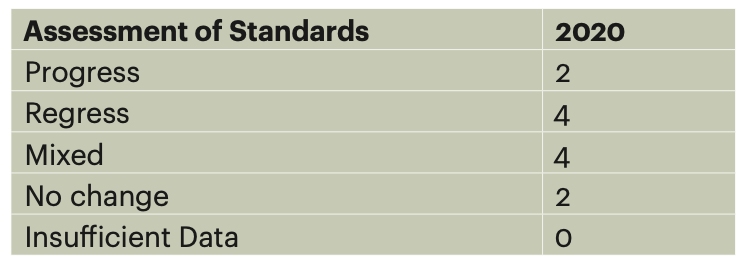Executive Summary (2020)
Coinciding with the start of a new cycle of Progress in the Penal System (PIPS), 2020 has been an extraordinary year to examine penal reform, given the context of the pandemic.
At the end of the first three-year cycle of PIPS (2017–2019), our overall assessment was that progress in the penal system in Ireland was underway, albeit at a slower pace than the project originally envisioned. An emergency period, the Covid-19 pandemic, has shown how rapidly positive change can occur – most notably, there was a substantial reduction in prisoner numbers within a month of the pandemic being declared.
The State must now build upon the progress it has made in a time of crisis and sustain this positive change. It must also work to address shortcomings outlined in PIPS 2020.
Part One
PIPS 2020 provides an overview of the penal system’s initial response to Covid-19 in Ireland. Compared with neighbouring jurisdictions, the Irish Prison Service (IPS) did exceptionally well in keeping Covid-19 out of Ireland’s prisons. There were zero Covid-19 cases in prisons during Ireland’s first lockdown. This achievement is widely recognised. However, it must not be the only measure used to determine success. This section outlines the importance of meeting minimum human rights obligations, and underlines that any measures that may impinge on human rights must be proportionate, necessary and time-limited.
Prisoners experienced more than the deprivation of liberty throughout the pandemic; the rehabilitative purpose of imprisonment was vastly diminished. Any regress that has occurred due to the pandemic must not become the accepted norm in future. As the pandemic continues to unfold, consideration of its impact on prisons and people imprisoned should be included in decisions relating to sentencing and release.
There are several lessons to be learned from Ireland’s response:
- Strong leadership can make penal reform a reality
- Penal moderation is possible
- Safe custody limits are imperative
- Prison health is public health
- Confinement has negative consequences for physical and mental health
- Restrictive measures must be continually reviewed
- Technology has the potential to transform prisons
- Good communications support safer prisons
- Lack of published information means lack of accountability
- Collaboration and community engagement benefits everyone
These lessons are fully explored in Part One, and should inform decision-makers on future directions of penal reform.
Part Two
The second part of PIPS 2020 focuses on 12 of 35 standards that a best practice penal system must meet, grouped into four interconnected thematic areas. The statistical data obtained for this project primarily relates to the period mid-2019 to mid-2020.
1. Reducing the use of imprisonment
‘Progress’ has been identified under Standard 1: Progressive Penal Policy. This includes several penal reform commitments in the Programme for Government, and the publication of evidence reviews by the Department of Justice. The PIPS standards informed the new Framework for the Inspection of Prisons in Ireland.
Standard 2: Imprisonment as a last resort provides evidence of Ireland’s long-term trend (in the wrong direction) of sending people to prison for short periods. This standard receives a ‘mixed’ rating because positive measures were introduced by the State to significantly reduce the prison population during the pandemic. These measures must continue to be applied.
Finally, the remand population’s continued annual growth is identified as ‘regress’ under Standard 10: Pre-trial detention as a last resort.
Actions that should be taken to reverse negative trends are identified, including: enshrining imprisonment as a last resort in legislation; the operationalisation of the Consultative Council to advise on penal reform; and the development of bail supports.
2. Prison Conditions and Regimes
Poor prison conditions and regimes should never be used as an additional form of punishment. The Covid-19 pandemic exposed chronic issues in prison systems worldwide, such as overcrowding. There has been little insight into Ireland’s prison conditions due to the absence of published inspections and monitoring reports.
Immediately prior to the pandemic, there was regress on the goal of single-cell occupancy (Standard 9) with new beds added in three prisons. The number of prisoners sharing cells was reduced during the pandemic. The reduction in prisoner numbers provides an opportunity to implement a single-cell accommodation policy that supports men and women’s dignity in prisons.
The right to family life is explored under Standard 11: Family Contact and receives a ‘mixed’ assessment. The roll-out of video calls and in-cell phone provision in parts of the prison estate are positive features that emerged from the crisis, and should be retained as supplementary to prison visits. Amendments were made to prison rules, which allow for the suspension of entitlements to prison visits in certain circumstances. An Oireachtas Committee on Human Rights should be established and should examine the human rights implications of such changes.
Out-of-cell time (Standard 16) is assessed as ‘regress.’ An increased number of prisoners experienced restricted regimes during 2020 due to medical reasons. Just five hours of out-of-cell time was available to the general prison population in some prisons. Restrictions must be proportionate, medically necessary, and time-limited.
There was also ‘regress’ in terms of an increase in the number of persons held in solitary confinement (Standard 26). A change to the European Prison Rules requests States to set a maximum period in which solitary confinement can be allowed. This should be incorporated into Irish law.
3. Health & Mental Health
Public health has been a global concern in 2020. While the Irish Prison Service must be commended for taking a public health-led approach to infection control and keeping the prison population largely Covid-free, there has been less progress in the area of mental health.
The prison health needs assessment undertaken in 2020 represents ‘progress’ (Standard 12). The final report must be published and its findings imple- mented to address gaps in healthcare services.
Between 20 and 33 prisoners were on a waiting list for the Central Mental Hospital every month from July 2019 to July 2020. IPRT welcomes the establish- ment of a cross-departmental taskforce to address mental health, addictions and imprisonment. Progress in the area of mental health is therefore assessed as ‘mixed’ (Standard 13). These progressive developments must come to full fruition in 2021.
4. Oversight, Accountability, and Complaints
There has been no significant change to prison oversight and inspection over 2019/2020, with no inspection reports published. While additional resourcing of the Office of the Inspector of Prisons; the publication of the Framework for Inspection of Prisons; and commitments to reform prison visiting committees and ratification of OPCAT in the Programme for Government are all welcome, gaps in accountability mechanisms means the human rights of people in our prison system are exposed to potential abuse. This is especially acute during a time of a national and global emergency. Prisoners are still without access to a fully independent complaints mechanism.
Only through a rigorous inspection and monitoring regime, along with an independent complaints mechanism, can the rights of people in prison be safeguarded. Where prisoners have no access to independent avenues for redress, this fundamentally weakens access to their rights, undermines trust and creates tension within the prison.
Conclusion
Assessment of the 12 standards is summarised below:

Prison as a last resort must be the bedrock of penal policy; only then can the State ensure humane prison conditions and rehabilitative regimes. The prison population’s physical and mental health deserves significant attention, given the enduring impact of Covid-19 restrictions. Urgent steps need to be taken to ensure robust oversight at this time.
In November 2020, after this report was finalised, the European Committee for the Prevention of Torture published a report on its 2019 visit to inspect places of detention in Ireland. The findings and recommendations contained within the report have significant implications for the protection of human rights of people detained in Ireland. The pandemic response should add impetus and, we hope, the political will to act on these recommendations.
Out of the Covid-19 crisis comes an opportunity to act with immediacy and bring about change, towards fulfilling the PIPS vision. PIPS 2020 offers a roadmap to get there.


